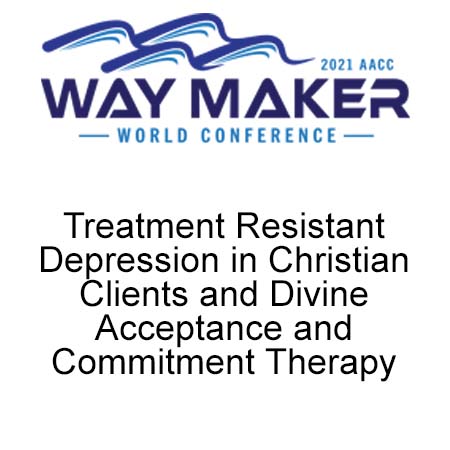Description
512: Treatment-resistant Depression in Christian Clients and Divine Acceptance and Commitment Therapy
Theresa Allen, Ph.D.
Liberty University
1971 University Blvd.
Lynchburg, VA 24515
Summary
Depression can occur at any time. While there may be numerous reasons for its onset, including organic issues, circumstances of life, and interpersonal struggles, negative rumination and emotional distress are common denominators for its lived experience. Cognitive Behavioral Therapy (CBT) has often been regarded as the gold standard treatment for depression due to its emphasis on self-awareness, cognitive restructuring, and challenging core beliefs. Many empirically-based, third-wave treatment modalities have emerged from the CBT therapeutic model. One such model is Acceptance and Commitment Therapy (ACT). ACT utilizes many of the key principles of CBT and then goes a step further. It teaches clients how to accept and build tolerance for pain and suffering. The principles of ACT parallel with many spiritually-based tenets, such as suffering is an unavoidable part of the human condition, negative mental scripts must be challenged, hope-focused thoughts should be rehearsed, management of the mind and emotions are intentional practices, and developing congruent values and behaviors are necessary to ameliorate cognitive dissonance. Additionally, ACT addresses metaphysical transcendence and self-as-context, which are vital concepts grounded in the sacred. Studies have elucidated the impact that existential contemplations have on depression, such as, “Is God mad at me?” or “Is God really good?” As such, spiritual struggles have been correlated with psychological distress and other depressive symptoms. This proposed presentation will discuss the efficacy of utilizing ACT as a spiritually integrated psychotherapy treatment for depressed Christians. It will analyze the six principles of ACT through a biblical lens, describe integrated interventions that are value-driven and structured for working with Christians, and provide instructional strategies for therapists to be both clinically sound and spiritually attentive when working with clients.
Learning Objectives
Participants will:
• Discuss the empirical research on the benefits of integrating spirituality into the therapeutic process and analyze the six principles of Acceptance and Commitment Therapy through a biblical lens
• Describe integrated interventions for psychologists and licensed mental health professionals to help Christian clients better manage their depressed thoughts, emotions, and behaviors
• Develop strategies for therapists to be both clinically sound and spiritually attentive when utilizing a spiritually integrated approach to psychotherapy for depressed Christians





